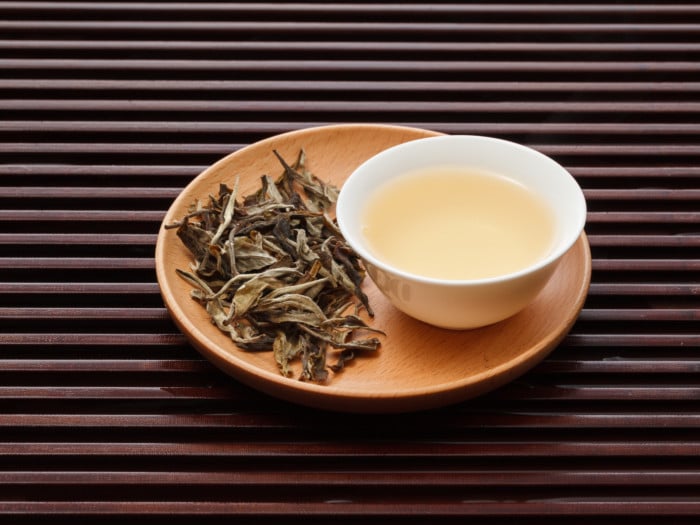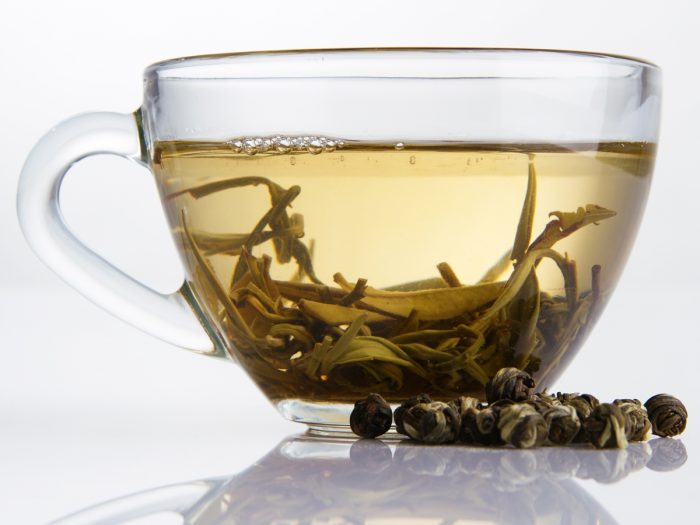canFor centuries, tea has been utilized by cultures around the world for its array of possible health benefits and calming effects. White tea is no exception; it has a variety of health benefits, which may include improved oral and skin health, antioxidant and cardioprotective properties, and weight loss benefits. With its potential antibacterial properties, white tea may also protect the body from various infection-causing bacteria.
Types of Tea
Tea that has not been processed in any way after drying is often called white tea. The name “white tea” is also given to tea prepared from immature or young buds, which leads to a milder flavor of the brewed tea. Either way, white tea describes the leaves of the Camellia sinensis plant and is one of the most popular varieties of tea in the world.
There are different types of tea that exist in the market. Green tea, black tea, hibiscus tea, and chamomile tea are examples of common types of tea. Intake of tea has for a very long time been known to have positive effects on human beings, and this is why people refer to it as the key ingredient to wisdom, happiness, and perfect health.
Though it is considered a common beverage, it has plenty of health benefits, which have been researched in several studies.
Green and black teas are considered equally beneficial, but it is the white tea that undergoes the least processing, which helps in retaining high levels of phytochemicals. Due to minimal processing, the production of white tea requires much less time and labor as computed to black tea or green tea.
History suggests that white tea may have originated in China. With the ever-changing dynasties of China, the production of white tea also changed. Over time, various types of tea were created using a selected type of tea bushes. [1]
White Tea Nutrition Facts
White tea contains nutrients and possible antimicrobial qualities that may help protect the body against many chronic diseases. It may contain tannins, fluoride, and flavonoids such as catechins and polyphenols. These compounds are responsible for the various benefits this tea provides. [2]
Health Benefits of White Tea
The health benefits of this variety of tea include:
Possible Antioxidant Potential

A white bowl of white tea. Photo Credit: Shutterstock
One study found that white tea extract increased the antioxidant capacity of organs and plasma in rats. Another test-tube study found that white tea extract protected neurons from hydrogen peroxide-induced damage. These findings suggest that white tea antioxidants may have potential health benefits, but more human studies are needed to confirm these findings. [3] [4]
Possible Antiaging Properties
As mentioned, free radicals may contribute to an accelerated aging process, along that comes with other challenges associated with advancement in age. White tea, with its antioxidant properties, may also reduce the risk of premature aging and reduce the visible signs of aging for some people. [5]
May Aid in Skin Care
This tea may also help in maintaining healthy and youthful skin. The use of this tea is recommended given its potential antioxidant properties, which may help in the quick repair and recovery of damaged skin. It may also be beneficial in protecting the skin against the effects of ultraviolet light, according to one study, giving it some possible photoprotective properties. [6]
May Improve Oral Health
The health benefits of white tea include improvement in oral health. The presence of polyphenols, flavonoids, and tannins is thought to help in inhibiting the growth of various bacteria that may cause plaque formation. [7] [8]
A study published in Molecule highlighted the potential of flavonoids and tannins from medicinal plants as therapeutic agents in oral infectious diseases like mouth ulcers etc. [9]
The fluoride content found in this tea may also be effective in reducing the risk of dental caries or tooth decay. However, much of the evidence is inconclusive, and more research is needed to prove these beneficial effects. [10] [11]
May Help Control Diabetes
One research study suggests that intake of white tea may provide relief to diabetics from symptoms such as excessive thirst (polydipsia), decreased plasma glucose levels, and increased insulin secretion.
Animal studies suggest that white tea is effective in reducing most of the diabetes-associated abnormalities in a streptozotocin-induced diabetes model of rats. [12] [13]
While more research is needed in this population, these are promising preliminary results.
May Improve Cardiovascular Disorder
White tea is a wholesome beverage with potential advantages for heart health, attributed to its rich content of polyphenols like flavonoids and catechins.
Flavonoids, found in abundance in white tea, have been associated with a reduced risk of various cardiovascular ailments. According to a study published in the Nutrients journal, eating flavonoids may help reduce your risk of high blood pressure, especially if you are overweight or obese. They contribute to this benefit by lowering blood pressure, enhancing endothelial function, addressing dyslipidemia, and inhibiting the oxidation of LDL cholesterol. However, it is not clear how much flavonoids you need to eat to get this benefit. [14] [15] [16]
Furthermore, the presence of catechins in white tea has been demonstrated to lower the risk of mortality from heart disease. According to a study published in American Heart Association journal, they have been shown to effectively lower systemic blood pressure, and contribute to improved endothelial function, enabling blood vessels to relax and dilate properly, thus promoting healthy blood flow.
[17]
May Act as an Antibacterial Agent
As mentioned, white tea has antibacterial properties, which can protect our skin from bacteria and other germs. Various products such as hand soap are made using this tea as a key ingredient. Consumption of white tea may help in protecting our body from infection-causing bacteria and other microorganisms. [18]
May Relieve Common Cold
White tea is thought to be a good remedy for various common ailments. The intake of white tea provides relief to those suffering from the flu and the common cold given its unique profile of antioxidants. [19]
May Aid in Weight Loss
White tea is a type of tea that is less processed than other varieties, such as green and black tea. This means that it contains more antioxidants and other beneficial compounds.
One of the main ways that white tea helps with weight loss is by boosting metabolism. Catechins, a type of antioxidant found in white tea, have been shown to increase the body’s metabolic rate in animals. This means that the body burns more calories at rest, which can lead to weight loss over time, but more research is needed on humans. [20] [21] [22] [23]
White tea also contains theanine, an amino acid that has been shown to promote relaxation and reduce stress. Stress can lead to weight gain, so reducing stress levels can be helpful for weight loss. Additionally, theanine may help to suppress appetite. [24] [25] [26]
Polyphenols, another type of antioxidant found in white tea, have been shown to improve insulin sensitivity and reduce inflammation. Insulin resistance is a major factor in weight gain, so improving insulin sensitivity can help to promote weight loss. Inflammation has also been linked to weight gain, so reducing inflammation can also be helpful for weight loss. [27] [28]
White tea appears to be a boon, and appropriate to add to almost any and all diets for weight reduction. [29]
How to select & consume White Tea?
It is ideal to drink white tea when bought and brewed in the form of loose leaves. Consuming tea brewed from these leaves provide guarantees the existence of nutrients in their actual form, which is considered better than tea bags that have undergone processing.
The brewing process of white tea is similar to that of other types of tea. It is always recommended that pure or clean water should be used in brewing. The water should be heated through, but not brought to the boiling point, as this may destroy the sensitive components.
For a more concentrated tea that is rich in flavor, steeping the tea for longer than usually recommended. One to two teaspoonfuls of white tea leaves is the ideal quantity per cup.
The intake of around 2 to 4 cups daily, as opposed to just one, has numerous health benefits. There is nothing wrong with using the same tea leaves in preparation for more than one cup of tea. Not only is this cost-effective in a monetary sense, but it also allows you to extract all the nutrients in those tea leaves. The important point to note is that the second brewing should take longer than the first one.
Try out different types of white tea that are available in the market to spice up your tea intake. Celebrate good health by increasing the intake of white tea today.
FAQs
Is white tea good for you?
Yes, it is good for you, given its antioxidant content. As with other types of tea, it contains organic compounds and possible anti-aging substances that can help to reduce oxidative stress and prevent certain chronic diseases. It may help to protect the skin from ultraviolet light and possibly even boost the strength of the immune system.
How much caffeine is present in white tea?
There are only approximately 28 milligrams of caffeine in one 8 ounce cup of white tea, which gives it a relatively low level in comparison to other caffeinated beverages, such as coffee or green tea. For example, a similarly sized cup of coffee averages about 95 milligrams of caffeine, more than nearly three times the amount in white tea. In other words, it can provide an energetic boost, but perhaps isn’t as addictive and doesn’t result in withdrawal symptoms.
How to make white tea?
It can be made using the following steps:

Refreshing White Tea Recipe
Ingredients
- 8 oz filtered water
- 2 tsp white tea less for bud tea, more for leaf tea
- 1 tsp honey optional
Instructions
- To make white tea, boil 8 ounces of water in a pot. Once boiled, remove it from the stove, add 2 teaspoons of white tea to it. In case you are using the bud of the plant Camellia sinensis, then use 2 teaspoons. If you are the leaf tea, you can increase the quantity anywhere between 2 teaspoons to 2 tablespoons.
- For best results, let the boiled water cool for a minute or two, or else the tea will become scalded and slightly astringent.
- Once the water cools slightly, steep the white tea leaves for 7-10 minutes for optimal flavor. The longer you let the tea steep, the stronger the flavor becomes.
- Add a sweetener of your choice, in this case, we recommend honey. However, this step is optional. Enjoy your cup of tea!

Notes
Where to buy white tea?
White tea can be purchased at any grocery and natural health stores, as there is no debate about its health benefits. Tea is consumed in huge quantities all around the world, and while white tea is produced less than any other variety, it is still widely available. You can buy it in major big-box stores like Target and Walmart, as well as at independent herbalists, coffee and tea distributors, and farmers markets.

